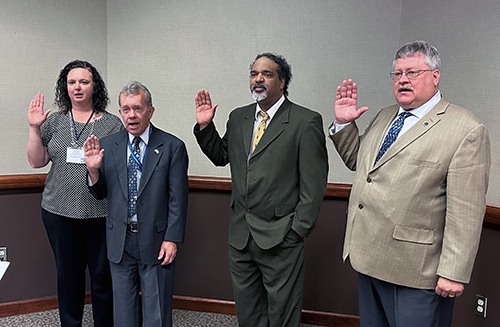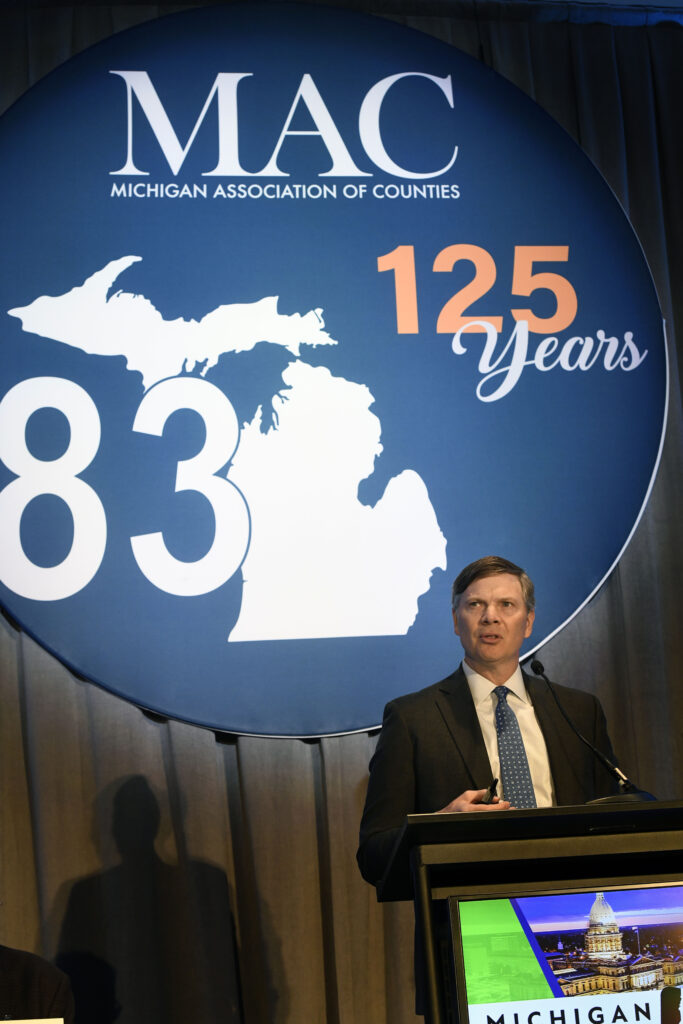County revenue sharing in line for big boost under budget plans
 County revenue sharing could grow by as much as 17 percent in fiscal 2024 under decisions made this week by key subcommittees in the Michigan House and Senate.
County revenue sharing could grow by as much as 17 percent in fiscal 2024 under decisions made this week by key subcommittees in the Michigan House and Senate.
In the House, the Appropriations Subcommittee on the General Government approved House Bill 4292, by Rep. Felicia Brabec (D-Washtenaw), which follows Gov. Gretchen Whitmer’s plan for a 17 percent hike in revenue sharing.
This increase is divided into several segments:
- 5 percentage points would be ongoing and for general use
- 5 percentage points would be a one-time appropriation for general use
- 2 percentage points would be ongoing and restricted to public safety uses
- 5 percentage points would be a one-time appropriation restricted to public safety uses
In all, these changes would place FY24 revenue sharing at more than $285 million.
The Senate’s boost is smaller than the House’s but still large. Senate Bill 189, by Sen. John Cherry (D-Genesee), includes the same ongoing and one-time boosts for general use as the House (see bullets 1 and 2 above), but it does not include the additional funds for public safety.
Overall, the Senate’s plan would have revenue sharing at $269 million for FY24.
In another positive note, and based on a MAC request, the Senate subcommittee plan would end the County Incentive Program and its requirements for the annual submission of verification of the posting of budgets online and the publication of citizen guides.
The Senate proposal also allows access to any unallocated funds from a $750 million appropriation for municipal pension assistance for use as grants for those local governments with OPEB obligations funded at 7 percent or less. An exact allocation for this will not be known until pension grants have been allocated.
Finally, on the Senate side, Sen. Cherry recommended a new program in the Department of Attorney General to assist communities with high crime by allocating $10 million and 45 full-time positions.
To be clear, these amounts are far from final. The next huge budget step is the Consensus Revenue Estimating Conference (CREC) on May 19 to set final resource numbers for FY24. Following CREC, committee chairs will be given more specific budget targets and will amend the bills accordingly.
For more information on this issue, contact Deena Bosworth at bosworth@micounties.org.
Five commissioners elected to MAC Board; Wayne’s Daub appointed as second vice president

New Board members (l-r) Sarah Lucido, Rick Shaffer, Dwight Washington and Bryan Kolk take their oaths on April 26. Not pictured: Donald O’Farrell.
During special elections held April 25 at the Michigan Counties Legislative Conference, county commissioners elected five new members to the Michigan Association of Counties Board of Directors.
The newest members of the 16-member governing body are:
- Dwight Washington of Clinton County
- Donald O’Farrell of Iosco County
- Sarah Lucido of Macomb County
- Bryan Kolk of Newaygo County
- Rick Shaffer of St. Joseph County
After they were sworn in on April 26, the five participated in a vote to name Melissa Daub of Wayne County as the MAC Second Vice President. Daub joined the MAC Board in 2021.
Also serving as officers for the Board in MAC’s 125th Anniversary year are President Stan Ponstein of Kent County and First Vice President Jim Storey of Allegan County.
For more information on the MAC Board, click here.
Association may be oldest in U.S., NACo leader tells 2023 conference

Matthew Chase addresses the 2023 Legislative Conference.
MAC and its members were treated to two anniversary presents at the 2023 Michigan Counties Legislative Conference.
Prior to his remarks on April 25 to a plenary session of the event, which drew approximately 300 to Lansing, Matthew Chase, CEO of the National Association of Counties, presented President Stan Ponstein and other MAC leaders a crystal trophy for the MAC display case.
More importantly, and surprisingly, Chase shared a bit of news: MAC just may be the oldest counties association in the entire country!
“I can say we were equal parts surprised and pleased to hear Matt’s nugget of news about our historic position,” said Stephan Currie, MAC’s executive director. “He did tell us his research isn’t quite complete, but, as of now, there’s no information that any association is older than MAC. If that holds, we will have even more to celebrate at the Anniversary Gala we are planning for the Annual Conference in October.”
The conference also included:
- State of MAC and Legislative Update reports
- A briefing on the state budget from State Budget Director Chris Harkins
- A discussion on legislative priorities with the leaders of the Michigan House and Senate
- 12 policy breakout sessions
Presentations and other documents from the conference can be found here.
Photos from the conference can be found here.
MAC’s next major event is the Annual Conference, planned for Oct. 1-3 at the Radisson Hotel in downtown Kalamazoo. Registration for that event should open in early August.
For the latest information on MAC events, click here.
Child Care Fund boost highlights DHHS budget plans
 A MAC-supported increase in the reimbursement rate for the Child Care Fund is included in both legislative versions of the fiscal 2024 budget for the Department of Health and Human Services that cleared key subcommittees this week.
A MAC-supported increase in the reimbursement rate for the Child Care Fund is included in both legislative versions of the fiscal 2024 budget for the Department of Health and Human Services that cleared key subcommittees this week.
In line with a recommendation of the Task Force on Juvenile Justice Reform, the budget plans boost the county Child Care Fund reimbursement rate from 50 percent to 75 percent, a $31.5 million increase. This conforms with Gov. Gretchen Whitmer’s FY24 budget plan.
The House subcommittee also recommended:
- $1.3 million to provide services at Bay Pines and Shawono juvenile justices facilities (another recommendation from the Task Force on Juvenile Justice Reform)
- $19.3 million to fund an 8 percent increase to daily maintenance payments to foster parents, adoptive parents and juvenile guardians (a MAC legislative priority)
- Placing Michigan’s foster care per diem rate above the national average
- $25 million to build a juvenile justice facility in Northern Michigan (another MAC priority)
- $14 million for the state share towards local public health departments
- $5 million to replace local funding used for Medicaid mental health supports and services (this reflects the fourth year of phasing out the local match portion over a five-year period)
The Senate recommendation includes $30 million to support the state share for increases to local public health departments, which aligns with the governor’s budget plan. When compared to the House recommendation, you will see the House has only recommended funding for approximately 50 percent of the costs of local public health services.
For more information on this issue, contact Samantha Gibson at gibson@micounties.org.
Legislative panels add dollars to governor’s transportation plans
 Road dollars in fiscal 2024 would be more plentiful than Gov. Gretchen Whitmer had proposed in February under spending plans approved by House and Senate subcommittees this week.
Road dollars in fiscal 2024 would be more plentiful than Gov. Gretchen Whitmer had proposed in February under spending plans approved by House and Senate subcommittees this week.
Both chambers appropriated more than Whitmer recommended; the House version is $222.6 million over, while the Senate’s is $240 million over.
The largest addition by the House is $400 million for local road preservation, which would be distributed to local road agencies based on population. The House left a $100 placeholder for the bridge bundling program, so the $200 million the governor had recommended was not included in the House plan.
The House also included:
- $75 million in local bus operating investments
- $33 million for rail grade separations
The Senate also cut the governor’s bridge bundling program, reducing it from $200 million to $150 million. They also cut the Intermodal Capital Investment Grant Program from $160 million to $100 million.
Notably, the Senate added $150 million for local road funding projects for the six most populous counties (Wayne, Oakland, Macomb, Kent, Genesee, Washtenaw), distributed by population. Subcommittee Chair Sen. Veronica Klinefelt (D-Macomb) explained that while the larger counties pay more into the Michigan Transportation Fund, they don’t always see the return on investment.
The Senate also included:
- $100 million for critical infrastructure projects
- $100 million for high-speed rail
- $50 million for a single rail grade separation project in Trenton
The budget process will continue in May. MAC will provide updates as necessary.
For more information on this issue, contact Madeline Fata at fata@micounties.org.
Pay boosts for medical workers advance in Legislature
 Employees at medical care facilities would be looking at pay boosts under budget plans approved by Health and Human Services Appropriations subcommittees for fiscal 2024 this week.
Employees at medical care facilities would be looking at pay boosts under budget plans approved by Health and Human Services Appropriations subcommittees for fiscal 2024 this week.
The Senate recommendation includes a 65-cent boost per hour for direct care workers and a $3 per hour wage increase for non-direct care staff at long-term care facilities. The House recommendation includes $90 million to increase non-clinical nursing facility staff hourly wages by $3.85 per hour. This amount would reflect the current $2.35 direct care wage increase, plus the additional $1.50 proposed for the current cohort of direct care workers. The House budget recommendation also included a $1.50 per hour direct care worker wage increase.
The FY24 budget is anticipated to be finalized in June.
For more information on this issue, contact Samantha Gibson at gibson@micounties.org.
Bid to expand binding arbitration resumes in Legislature
 County correctional officers would qualify for binding arbitration under a bill filed in Lansing on April 20.
County correctional officers would qualify for binding arbitration under a bill filed in Lansing on April 20.
House Bill 4438, by Rep. Kelly Breen (D-Oakland), would expand binding arbitration beyond police and fire labor bargaining units to county correctional officers. The bill is likely to advance in the Legislature this year.
HB 4438 is a reintroduction from last term, which MAC fought against. MAC has long opposed any expansion of binding arbitration to other bargaining units due to the cost of the process, the long-term liabilities associated with third-party decisions and the unequal treatment such a system provides to those bargaining units. The Michigan Public Employment Relations Act already provides for bargaining rights without tying the hands of the county in binding arbitration.
MAC plans to continue opposition to the bill.
However, in light of the legislative majority’s strong support for unions and collective bargaining units, it will certainly be more difficult to shut it down this time around. The bill has been referred to the House Committee on Criminal Justice.
For more information on this issue, contact Madeline Fata at fata@micounties.org.
Boat wrap recycling program now under way
 The Michigan Recycling Coalition (MRC), a statewide recycling advocate and association, is currently organizing another year of “Recycle Run,” a boat shrink-wrap recycling program. Last year alone, the program helped recycle 90,000 pounds of plastic.
The Michigan Recycling Coalition (MRC), a statewide recycling advocate and association, is currently organizing another year of “Recycle Run,” a boat shrink-wrap recycling program. Last year alone, the program helped recycle 90,000 pounds of plastic.
The program is open and accepting new participants until June 1, 2023. Recycle Run is accessible to boaters across the state and allows for shrink-wrap boat covers to be diverted from landfills.
To participate, boaters purchase the Recycle Run bags from Dr. Shrink’s website for $7. A bag holds approximately one large boat cover or two small boat covers. Interested participants will also sign up on the Michigan Recycling Coalition’s website to officially register for the collection program. Participants with more than 15 bags of material qualify for a free direct pick-up by the MRC’s program partners. Participants with less material can participate by dropping their bags off at one of the many volunteer locations around the state. These boat covers are otherwise not accepted in curbside recycling programs.
Michigan has more than 800,000 registered boats. For every bag of covers that is recycled, we save:
- 115 KWH of energy
- 5 gallons of oil
- 20 cubic feet of landfill space
The MRC is a nonprofit that fosters sustainability by leading, educating and mobilizing businesses, governments, nonprofits and individuals to advance their own and collective resource use and recovery initiatives in Michigan.
NACo: Highlight the county role in mental health in May
 Join the National Association of Counties (NACo) and the National Association of County Behavioral Health and Developmental Disability Directors in recognizing Mental Health Awareness Month, May 2023, to highlight the county role in behavioral health.
Join the National Association of Counties (NACo) and the National Association of County Behavioral Health and Developmental Disability Directors in recognizing Mental Health Awareness Month, May 2023, to highlight the county role in behavioral health.
Earlier this year, NACo launched a Commission on Mental Health and Wellbeing to address the ever-growing mental health crisis. Next month, NACo will release research on essential county perspectives on high-quality, accessible mental health services.
Mental Health Awareness Month is your opportunity to shine a light on mental health awareness, services, and innovation, and advance behavioral health policy priorities.
Explore NACo’s toolkit of resources to help you participate, including a resolution template, sample letters to Congress, press release and social media templates, and more. We encourage counties to pursue any effort – large or small.
We look forward to featuring county efforts – submit your plan for Mental Health Awareness Month here.
 Staff picks
Staff picks
- Michigan county officials meet to tackle big issues (WILX-TV)
- Walmart is sued over ‘dark store theory’ as thousands of local shoppers fear being hit by ‘devastating’ tax bill (The Sun)
- California county recycles all its wastewater, a world first (Governing)
- How to leverage public-private partnerships to drive economic development (American City and County)
